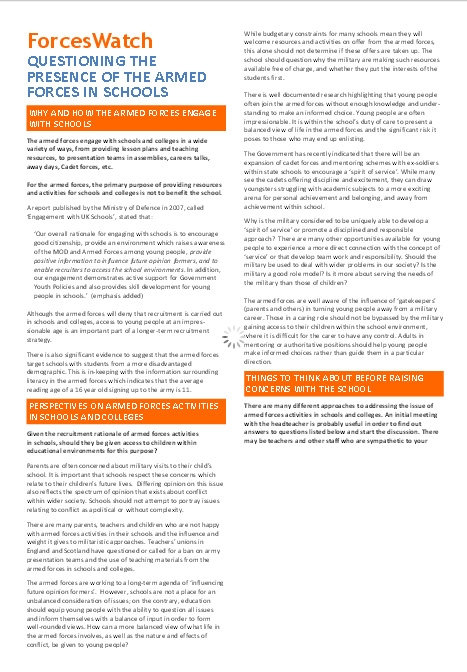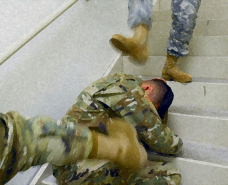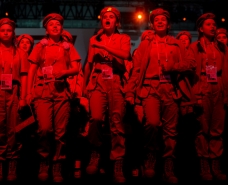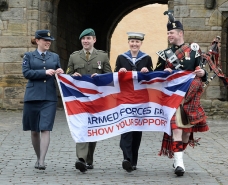Questioning the Presence of the Armed Forces in Schools: report

Forces Watch -
WHY AND HOW THE ARMED FORCES ENGAGE WITH SCHOOLS
The armed forces engage with schools and colleges in a wide variety of ways, from providing lesson plans and teaching resources, to presentation teams in assemblies, careers talks, away days, Cadet forces, etc.
For the armed forces, the primary purpose of providing resources and activities for schools and colleges is not to benefit the school.
A report published by the Ministry of Defence in 2007, called ‘Engagement with UK Schools’, stated that:
‘ Our overall rationale for engaging with schools is to encourage good citizenship, provide an environment which raises awareness of the MOD and Armed Forces among young people, provide positive information to influence future opinion formers, and to enable recruiters to access the school environments . In addition, our engagement demonstrates active support for Government Youth Policies and also provides skill development for young people in schools.’ (emphasis added)
Although the armed forces will deny that recruitment is carried out in schools and colleges, access to young people at an impressionable age is an important part of a longer-term recruitment strategy.
There is also significant evidence to suggest that the armed forces target schools with students from a more disadvantaged demographic. This is in-keeping with the information surrounding literacy in the armed forces which indicates that the average reading age of a 16 year old signing up to the army is 11.
PERSPECTIVES ON ARMED FORCES ACTIVITIES IN SCHOOLS AND COLLEGES
Given the recruitment rationale of armed forces activities in schools, should they be given access to children within educational environments for this purpose?
Parents are often concerned about military visits to their child’s school. It is important that schools respect these concerns which relate to their children’s future lives. Differing opinion on this issue also reflects the spectrum of opinion that exists about conflict within wider society. Schools should not attempt to portray issues relating to conflict as apolitical or without complexity.
There are many parents, teachers and children who are not happy with armed forces activities in their schools and the influence and weight it gives to militaristic approaches. Teachers’ unions in England and Scotland have questioned or called for a ban on army presentation teams and the use of teaching materials from the armed forces in schools and colleges.
The armed forces are working to a long-term agenda of ‘influencing future opinion formers’. However, schools are not a place for an unbalanced consideration of issues; on the contrary, education should equip young people with the ability to question all issues and inform themselves with a balance of input in order to form well-rounded views. How can a more balanced view of what life in the armed forces involves, as well as the nature and effects of conflict, be given to young people?
While budgetary constraints for many schools mean they will welcome resources and activities on offer from the armed forces, this alone should not determine if these offers are taken up. The school should question why the military are making such resources available free of charge, and whether they put the interests of the students first.
There is well documented research highlighting that young people often join the armed forces without enough knowledge and under - standing to make an informed choice. Young people are often impressionable. It is within the school’s duty of care to present a balanced view of life in the armed forces and the significant risk it poses to those who may end up enlisting.
The Government has recently indicated that there will be an expansion of cadet forces and mentoring schemes with ex-soldiers within state schools to encourage a ‘spirit of service’. While many see the cadets offering discipline and excitement, they can draw youngsters struggling with academic subjects to a more exciting arena for personal achievement and belonging, and away from achievement within school.
Why is the military considered to be uniquely able to develop a ‘spirit of service’ or promote a disciplined and responsible approach? There are many other opportunities available for young people to experience a more direct connection with the concept of ‘service’ or that develop team work and responsibility. Should the military be used to deal with wider problems in our society? Is the military a good role model? Is it more about serving the needs of the military than those of children?
The armed forces are well aware of the influence of ‘gatekeepers’ (parents and others) in turning young people away from a military career. Those in a caring role should not be bypassed by the military gaining access to their children within the school environment, where it is difficult for the carer to have any control. Adults in mentoring or authoritative positions should help young people make informed choices rather than guide them in a particular direction.
THINGS TO THINK ABOUT BEFORE RAISING CONCERNS WITH THE SCHOOL
There are many different approaches to addressing the issue of armed forces activities in schools and colleges. An initial meeting with the headteacher is probably useful in order to find out answers to questions listed below and start the discussion. There may be teachers and other staff who are sympathetic to your concerns. One start may be talking to your child’s class teacher. Or are there other parents who share your concerns? Raising the issue as a group or getting a number of parents to raise the issue individually is likely to be more effective than a lone voice.
The armed forces say that they only provide activities within schools on the basis of an invitation by the school itself. Given that the activities of the armed forces are often not questioned in wider society, it may be that the school is unaware that parents will have concerns about the armed forces being in contact with their children through the school. It is all the more important that concerns and questions are raised by parents to inform the school of the difference of opinion on the issue. This may influence how they deal with it in the future.
While many people feel that the armed forces should not be active in schools on the basis of their own political beliefs it may be more productive to approach discussions with the school using arguments that focus on the inappropriateness of an education environment for this kind of activity and how to address the balance of information being given to the students.
POINTS TO RAISE WITH THE SCHOOL
What are your primary concerns? A list of well considered points will help in making your case to the school and other parents. As well as questions about the appropriateness of military involvement with schools (overleaf), below are concerns that the school and the students should be made aware of.
Risks: The risks involved in an armed forces career are rarely fully spelt out. Emphasis is put on the positive side of joining up. Risks don’t just involve serious physical injury or death but also mental problems, from stress to long-term conditions such as Post Traumatic Stress Disorder (PTSD), and a variety of difficulties adapting back to civilian life. Ex-servicemen and women are over- represented amongst the homeless and those in prison.
Legal obligations: Information given to potential recruits generally doesn’t make clear the legal obligations of enlisting. After a short window during which a recruit may reconsider and leave, the minimum service period is generally 4 years. The period of notice is a year. If someone joins before turning 18, they are contracted to stay in the military for up to six years, or until their 22 nd birthday. The forces are the only area where such restrictive employment practices exist and where someone can face a criminal conviction for breaking their contract. Around 2000 servicemen and women go AWOL (Absent With Out Leave) each year.
Ethical concerns: The moral dilemmas that many soldiers will face are rarely discussed during contact with students. Whatever their other activities, every person in the services is trained to use a weapon against other human beings. This, and its potential psycho - logical impact, is not made explicit. Many in the forces develop ethical concerns after they have joined up about the conflicts they are involved in and what they are asked to do.
Image versus reality: The realities of active service are quite different from the image given out about it. For example, in Iraq and Afghanistan, many operations have been carried out within civilian environments with the premise that those civilians are a potential threat. This is quite different from the conventional idea of who the enemy may be and cultural images handed down of army fighting army.
Misleading marketing: Advertising for the armed forces is deliberately designed to attract young people by focusing on what matters most to them. A recent focus on what the army calls ‘self development powered by the army’ engages young people in activities that they naturally enjoy such as computer games and winning at competitive tasks. Ministry of Defence resources such as Start Thinking Soldier and The Camouflage Club are examples of this. TV and other advertising promote a glamorous and uncritical view of the military and does not give a rounded picture of life in the armed forces.
QUESTIONS FOR THE SCHOOL
-
How did the armed forces become involved with the school?
-
What is the purpose of the armed forces providing activities for students at the school?
-
How do the students benefit?
-
Does the school think there are any risks involved? E.g. creating an unbalanced view of life in the armed forces and its activities
-
Has the school consulted parents, staff or governors?
-
Does the school do any activities that provide an alternative to what the armed forces can provide, such as building leadership and team skills, or provide a range of career presentations?
-
Does the school offer activities that look at issues of conflict? E.g. conflict resolution, peace building, or understanding the effects of war and the experience of being in the military?
- Would the school be interested in providing activities that explore issues of conflict from different perspectives?
ALTERNATIVES TO MILITARY-LED ACTIVITIES
Young people often state the following as a reason for enlisting:
-
To have an adventure or a career that will take them places
-
To work to help other people
-
To learn new skills
-
To serve their country
-
To start a career
-
Because there is a history of military service in the family
-
Because of the lack of other opportunities
- Because of the benefits (housing, salary) they would get in the armed forces
There are many ways that young people can fulfill their aims without joining the armed forces. It is important that it is not only the armed forces that are given the opportunity to say how aims such as these can be fulfilled by a career with them.
Alternative perspectives on conflict and life in the armed forces are available for schools to access. See the resources and websites listed below for further information.
MORE INFORMATION
Informed Choice? Armed forces recruitment practice in the United Kingdom
An independent report highlighting the risks posed to young people through joining the military, how young people from disadvantaged communities are targeted, how information available to potential recruits is often misleading and how the terms of service are complicated, confusing and severely restricting. This research found that a large proportion join for negative reasons, including the lack of civilian career options. http://www.informedchoice.org.uk/
Before you sign up
An independent website, setting out the pros and cons of enlisting in the UK armed forces. The site includes information and important questions for consideration for potential recruits to the Army, Navy/Marines and the RAF, those already in the forces, as well as parents and teachers. With many useful resources, including information on recruiting in schools and a lesson plan exploring issues around army recruitment, this site should be read by everyone before they sign up. http://beforeyousignup.org.info
At Ease
A voluntary organisation providing advice and information to members of the armed forces, their families and friends. Free leaflets are available and a speaker from AT EASE can visit any area in UK to speak to groups about their work. http://www.atease.org.uk/
Peace Education Network
A network of groups working in education to equip young people in the UK with the skills to bring about a peaceful world. This website is to support education practitioners in their practice. http://www.peace-education.org.uk
A variety of peace education resources, background information, useful materials and other resources can be found at http://forceswatch.net/resources
If you would like further information or advice from ForcesWatch, please contact us on office@forceswatch.net or 020 7837 2822
Source: http://forceswatch.net
###
Countering Military Recruitment

WRI's new booklet, Countering Military Recruitment: Learning the lessons of counter-recruitment campaigns internationally, is out now. The booklet includes examples of campaigning against youth militarisation across different countries with the contribution of grassroot activists.
You can order a paperback version here.








